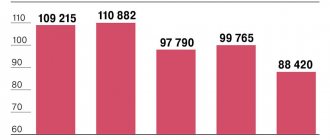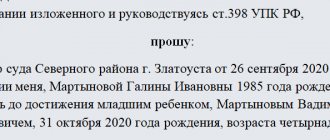ST 82.1 of the Criminal Code of the Russian Federation.
1. A convict who has been sentenced to imprisonment for the first time for committing a crime provided for in part one of Article 228, part one of Article 231 and Article 233 of this Code, who has been recognized as a drug addict and has expressed a desire to voluntarily undergo a course of treatment for drug addiction, as well as medical rehabilitation, social rehabilitation, the court may defer serving a sentence of imprisonment until the end of treatment and medical rehabilitation, social rehabilitation, but not more than for five years.
2. If a convicted person, recognized as a drug addict, whose sentence is suspended, refuses to undergo a course of treatment for drug addiction, as well as medical rehabilitation or social rehabilitation, or evades treatment after a warning announced by the body monitoring the behavior of the convicted person, the court shall upon the submission of this body, cancels the deferment of serving the sentence and sends the convicted person to serve the sentence to the place appointed in accordance with the court verdict.
3. After completing a course of treatment for drug addiction, medical rehabilitation, social rehabilitation and in the presence of objectively confirmed remission, the duration of which after the end of treatment, medical rehabilitation, social rehabilitation is at least two years, the court releases the convicted person, recognized as a drug addict, from serving his sentence or the remainder of the punishment.
4. If the court establishes that a convicted person recognized as a drug addict, whose sentence has been suspended, has committed a crime not specified in part one of this article, the court, upon the proposal of the body exercising control over the behavior of the convicted person, cancels the deferment of serving the sentence, imposes a punishment according to the rules, provided for by part five of Article 69 of this Code, and sends the convicted person to serve the sentence to the place appointed in accordance with the court verdict.
5. If, during the period of deferment of serving the sentence, a convict recognized as a drug addict has committed a new crime, the court will cancel the deferment of serving the sentence, assign him a punishment according to the rules provided for in Article 70 of this Code, and send the convict to the place appointed in accordance with the sentence court
Commentary to Art. 82.1 Criminal Code
1. A deferment may be applied if the following set of conditions are met:
a) the convicted person is sentenced to imprisonment. When imposing other types of punishment, the type of deferment in question is not applied;
b) the crime was committed for the first time;
c) the crime is provided for in Part 1 of Art. 228, part 1 art. 231 or Art. 233 CC;
d) the convicted person is addicted to drugs;
e) the offender has expressed a desire to voluntarily undergo drug addiction treatment, as well as medical and social rehabilitation.
The deferment is provided until the end of medical and social rehabilitation treatment, but not more than five years.
2. The execution of a court decision to defer serving a sentence is entrusted to the penal inspection at the place of residence of the convicted person, to which a copy of such a decision is sent.
The administration of the correctional institution, having received a court ruling, releases the convict. The latter is required to sign to appear at the criminal-executive inspection at the place of residence within three days from the date of arrival.
The criminal-executive inspection registers the convicted person and subsequently monitors his behavior and completion of drug addiction treatment, as well as medical and social rehabilitation.
3. The basis for granting a deferment is the presence of drug addiction, which significantly complicates the corrective effect of the actual imprisonment being served.
4. A deferment from serving a sentence is a conditional type of release from punishment. It is canceled if:
a) the convicted person refused to undergo treatment for drug addiction, as well as medical and social rehabilitation;
b) the convicted person refuses treatment after a warning issued by the body exercising control over the behavior of the convicted person;
c) the court has established the fact that a convicted person (before his conviction), recognized as a drug addict, whose sentence was suspended, committed a crime not specified in Part 1 of Art. 82.1 CC;
d) during the period of deferment of serving the sentence, the convict, recognized as a drug addict, committed a new crime.
In all of the above cases, the court, upon the proposal of the body monitoring the behavior of the convicted person, cancels the granted reprieve from serving the sentence and sends the convicted person to serve the sentence to a place appointed in accordance with the court verdict; imposes punishment according to the rules provided for in Part 5 of Art. 69 of the Criminal Code, and sends the convicted person to serve his sentence to the place appointed by the court verdict (clause “c”); assigns him a punishment according to the rules provided for in Art. 70 of the Criminal Code, and sends the convicted person to the place appointed in accordance with the court verdict (clause “d”).
5. After the convicted person has completed a course of treatment for drug addiction, as well as medical and social rehabilitation, and in the presence of remission, the duration of which after the end of treatment and medical and social rehabilitation is at least two years, a criminal-executive inspection at the place of residence of the convicted person, taking into account the doctor’s opinion and behavior of the convicted person sends to the court a proposal to release the convicted person from serving his sentence or the remaining part of it.
Dismissal based on certification results
Termination of employment relations with an employee who is not suitable for his position due to insufficient qualifications is permitted if such a fact is confirmed by the result of certification.
According to Article 82 of the Labor Code, when dismissing an employee, the composition of the certification commission is taken into account, whose conclusion will affect the person’s future employment. A representative of a trade union organization must be a member of the certification commission and be present when making an opinion on the employee’s qualifications. It follows that the organization must have a proven mechanism for conducting certification. The composition of such a commission should be formed on a permanent basis and include a representative from the trade union. Otherwise, during the trial, the certification conclusion will be declared illegal.
If the employee does not agree with the reason for the upcoming dismissal (“due to lack of qualifications”), then the result of the certification can be challenged in court. The employer must take into account the priority right of a person to continue working in the organization, the basis of which is the productivity and qualifications of the employee. Preferences (other things being equal) are provided:
- people with two or more dependents;
- workers who are the sole breadwinners for their family;
- workers who contracted an occupational disease at this enterprise;
- combat disabled people;
- employees who continuously improve their skills, but without interruption from production.
The result of certification can be not only dismissal. The employer retains the right to transfer the employee to another position or send him for advanced training. It is necessary to document in writing evidence that the employee was offered an alternative job option or the reason why the organization does not have the opportunity to transfer the employee. It is also worth recording the fact that the worker refuses the new position.
Second commentary to Art. 82.1 of the Criminal Code of the Russian Federation
1. This type of exemption from punishment is optional.
2. The court has the right to grant a deferment of serving the sentence if:
- committed a crime under Part 1 of Art. 228, part 1 art. 231 or Art. 233 CC;
- sentenced to imprisonment for the first time;
- recognized as a drug addict;
— expressed a desire to voluntarily undergo drug addiction treatment, as well as medical and social rehabilitation.
3. To apply a deferment, it is necessary that the person has been convicted of committing any of the items listed in Part 1 of Art. 821 of the Criminal Code of crimes to imprisonment for the first time. If a person was previously convicted (regardless of the nature of the crime), but to a punishment not related to imprisonment, then the use of this type of deferment is not excluded. If, along with the listed crimes, a person has committed some other crime, a reprieve is not granted.
4. The court determines the presence or absence of drug addiction in a person on the basis of an expert opinion based on the results of a forensic psychiatric examination. The expert’s conclusion must contain a conclusion about the presence or absence of drug addiction in a person, as well as whether there are medical contraindications for treatment for such a disease (clause 35.1 of the resolution of the Plenum of the Supreme Court of the Russian Federation dated June 15, 2006 No. 14 “On judicial practice in cases of crimes related to narcotic drugs, psychotropic, potent and toxic substances”).
5. To apply the commented norm, it is necessary that the convicted person express in writing a desire to voluntarily undergo a course of drug addiction treatment, as well as medical and social rehabilitation, and undertake an obligation to comply with all the rules of treatment and rehabilitation.
6. The type of deferment in question is granted until the end of treatment and medical rehabilitation, as well as social rehabilitation of the convicted person, but for no more than five years.
The period required to carry out a course of treatment for a convicted person for drug addiction and his medical and social rehabilitation must be determined in the expert’s opinion (clause 35.2 of the resolution of the Plenum of the Supreme Court of the Russian Federation of June 15, 2006 No. 14).
7. If during the period of deferment it is established that before the pronouncement of a sentence for which the serving of the sentence for the convicted person was postponed, he, along with the crime provided for in Part 1 of Art. 228, part 1 art. 231 or Art. 233 of the Criminal Code, has also committed some other crime, then the court, on the proposal of the body monitoring the behavior of the convicted person, cancels the deferment of serving the sentence, imposes a sentence for the totality of crimes and sends the convicted person to serve the sentence in the appropriate correctional institution.
8. After the convicted person has completed a course of treatment for drug addiction and medical and social rehabilitation and in the presence of a remission confirmed by the results of chemical and toxicological studies, the duration of which is at least two years, the court, upon submission of the penal inspection, taking into account the conclusion of the attending physician and the behavior of the convicted person, releases a convicted person recognized as a drug addict from serving his sentence or the remaining part thereof.
9. Refusal to undergo a course of treatment for drug addiction, as well as medical rehabilitation or social rehabilitation, or evasion of treatment after a warning issued by the penal inspection, or the commission of a new crime during the period of deferment entails mandatory cancellation of the granted deferment and recourse to the execution of the punishment imposed by the sentence. court In case of refusal or evasion of treatment, as well as medical or social rehabilitation, the court makes a decision to cancel the deferment of serving the sentence only upon the proposal of the body monitoring the behavior of the convicted person.
10. Evading treatment for drug addiction, as well as medical and social rehabilitation, means that the convicted person, without refusing to undergo them:
- does not attend or has left without permission a medical or other organization providing social rehabilitation for drug addicts;
— failed to comply with the attending physician’s instructions twice;
- continues to use narcotic drugs or psychotropic substances;
- systematically (three or more times) consumes alcoholic beverages or intoxicants;
- engages in vagrancy or begging;
— hid from the control of the criminal-executive inspection and his whereabouts have not been established for more than 30 days.
11. If, during the period of deferment of serving the sentence, a convict recognized as a drug addict has committed a new crime, the court will cancel the deferment of serving the sentence and assign him a sentence based on the totality of sentences.
Union members
It should be noted that Part 2 of Art. 82 of the Labor Code of the Russian Federation when dismissing a worker is universal in nature and applies to both trade union members and other employees.
However, a trade union member can be dismissed only taking into account the motivated opinion of a human rights activist. The union's response not provided within 7 working days may not be taken into account by the organization. If the trade union committee disagrees, the parties are given 3 working days to conduct consultations, the conclusion of which is recorded. If consensus has not been reached within 10 days, then the organization’s management has the right to make a final decision.
The union can appeal the dismissal of an employee by filing a complaint with the labor inspectorate. Such an application will be considered by the state inspectorate within 10 days. And if she recognizes the dismissal of an employee as illegal, she will issue an order to the employer to reinstate the worker in his position with payment for forced absence.
The law does not stipulate consequences for the employer in the case when he did not notify the employment services and employee representatives. Reduction of staff is the right of the owner of the enterprise and cannot be contested.
Third commentary to Article 82.1 of the Criminal Code of the Russian Federation
1. The article under comment contains the grounds and conditions under which the court may defer serving a sentence to a person sentenced to imprisonment for committing a crime under Part 1 of Art. 228, part 1 art. 231 and Art. 233 of this Code. Among the grounds, the law names the following: committing one of these crimes for the first time; sentence to imprisonment; medical diagnosis of drug addiction. The condition for the application of this norm is the desire of the convicted person to voluntarily undergo a course of treatment for drug addiction, as well as medical and social rehabilitation. The deferment period cannot exceed five years. It should be noted again that this is a right of the court, not an obligation. In this case, the conclusion of a drug examination is important.
2. In the event of subsequent refusal or evasion from drug addiction treatment after a deferment, in the presence of an official warning, the court, on the proposal of a supervisory authority, may cancel the deferment and send the convicted person to serve an actual sentence in the form of imprisonment.
3. Part 3 of this article provides for the possibility of release from punishment or the remaining part of it for a convicted person who has undergone treatment for drug addiction and medical and social rehabilitation. In this case, one of the most important conditions is that the convicted person has an objectively confirmed remission, the duration of which is at least two years. It seems that conclusions about remission should also be made after a medical examination.
4. Parts 4 and 5 of the commented article provide for the procedure for imposing punishment when a convicted person commits a crime not specified in part one of this article, or a new crime during the period of deferment.
‹ Article 82. Deferment of serving a sentenceUp Article 83. Exemption from serving a sentence due to the expiration of the statute of limitations for a court conviction ›









